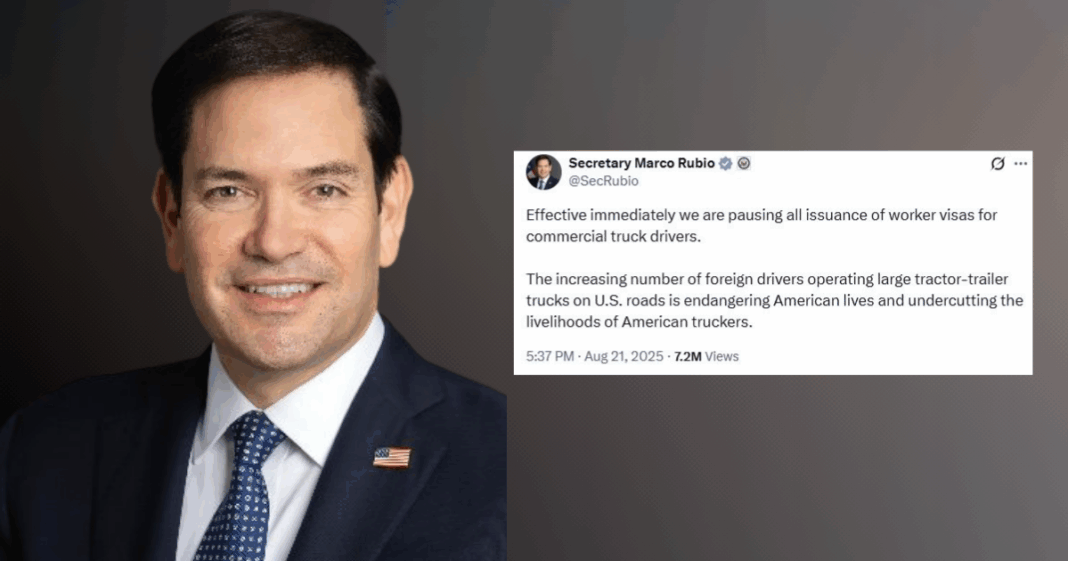- Secretary of State Marco Rubio said the U.S. is immediately pausing issuance of worker visas for commercial truck drivers .
- The State Department says the pause applies to all nationalities and allows a review of screening and vetting protocols.
- The move lands amid a driver shortage and stepped-up enforcement of English-proficiency rules; the American Trucking Associations voiced support for tighter scrutiny.
The Big Picture
The United States is pausing the issuance of worker visas for commercial truck drivers, effective immediately, Secretary of State Marco Rubio announced Thursday in a post on X . The State Department later said the pause is meant to allow “a comprehensive and thorough review of screening and vetting protocols” used to determine qualifications for a U.S. visa and emphasized that it applies to “all nationalities” and is not aimed at any single country.
What’s New
The department framed the step as a safety and standards review following incidents in which drivers’ language barriers allegedly contributed to traffic deaths. The administration has also stepped up enforcement of the long-standing requirement that commercial drivers speak and read English proficiently. Separately on Thursday, officials said they are examining records for more than 55 million people with valid U.S. visas to see whether any violated U.S. law and could face deportation.
What They’re Saying
“Effective immediately we are pausing all issuance of worker visas for commercial truck drivers. The increasing number of foreign drivers operating large tractor-trailer trucks on U.S. roads is endangering American lives and undercutting the livelihoods of American truckers.” — Marco Rubio, as posted on X
“Ensuring that every driver on our roads meets the highest standards is important to protecting the livelihoods of American truckers and maintaining a secure, resilient supply chain.” — State Department spokesperson, in a Thursday statement
Context
Rubio’s announcement followed a Florida highway crash in which a truck driver was charged with killing three people after an illegal U-turn. According to federal officials cited in subsequent reporting, the driver, an Indian national, allegedly entered the United States illegally from Mexico and failed an English examination after the crash. The case has drawn political attention in Florida and sparked cross-state recriminations over licensing and federal work authorization, according to AFP report.
Republicans have increasingly targeted the role of foreign-born truckers in crash statistics, while federal transportation officials say stricter enforcement of English-proficiency rules is aimed at improving safety. In June, Transportation Secretary Sean Duffy issued a directive reiterating that commercial drivers must speak English; a 2016 guidance under former President Barack Obama that discouraged taking drivers off the road solely over language deficiencies has been reversed, according to AFP.
The debate comes as the U.S. struggles with a commercial driver shortage. The American Trucking Associations estimate a shortfall of roughly 60,000 drivers and have urged rigorous enforcement of entry-level driver-training standards. Industry data show foreign-born drivers more than doubled between 2000 and 2021 to about 720,000, with foreign-born drivers now comprising roughly 18% of the workforce, according to federal statistics cited by industry groups. Many come from Latin America, with sizable numbers from India and Eastern Europe, including Ukraine.
What’s Next
The State Department did not provide a timeline for completing its review. Trucking companies and logistics operators are bracing for potential delays in filling driver seats if the pause continues, even as safety advocates welcome tighter checks. Any further rulemaking or guidance from the Transportation Department could clarify how English-proficiency and training standards will be enforced on the road.
The Bottom Line
Washington is pressing pause on new worker visas for commercial truck drivers to scrutinize vetting and qualifications, prioritizing road safety and domestic livelihoods while risking added strain on an industry already short on drivers.
A global media for the latest news, entertainment, music fashion, and more.














